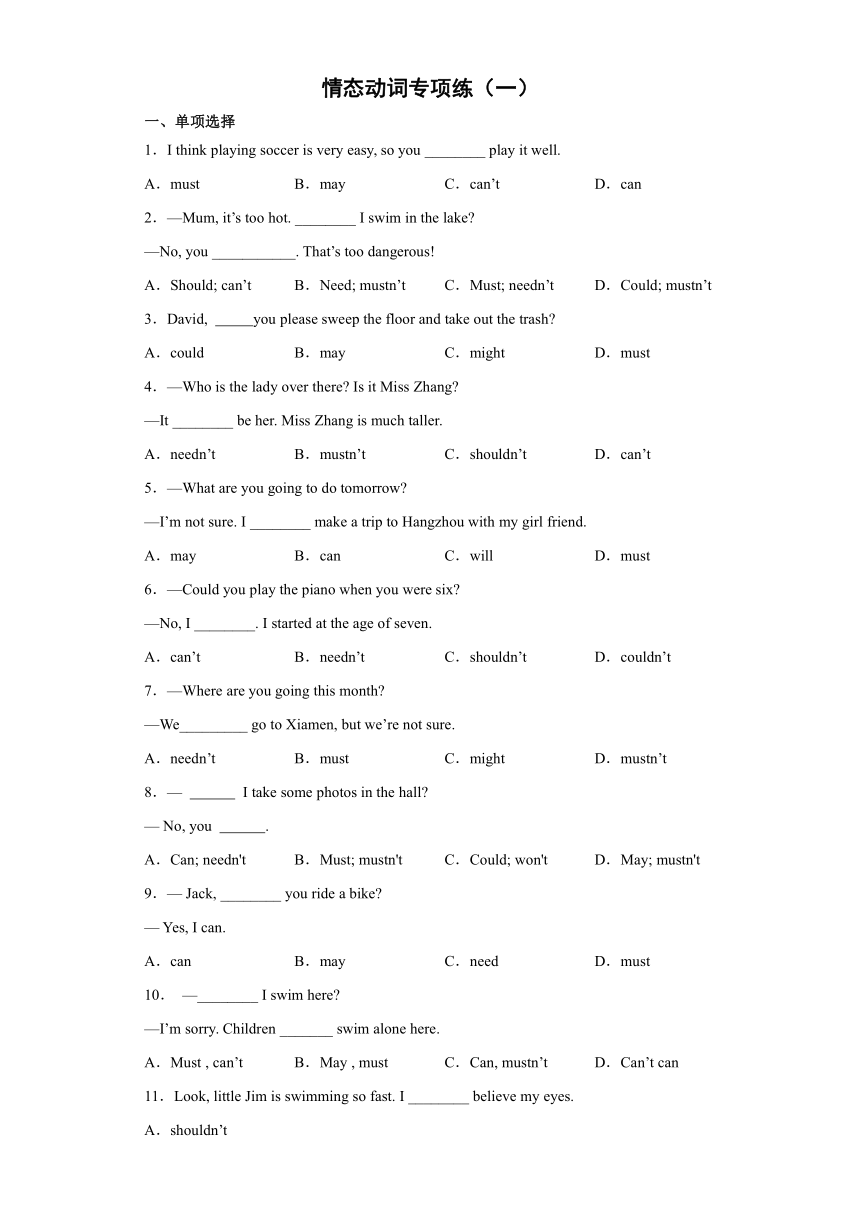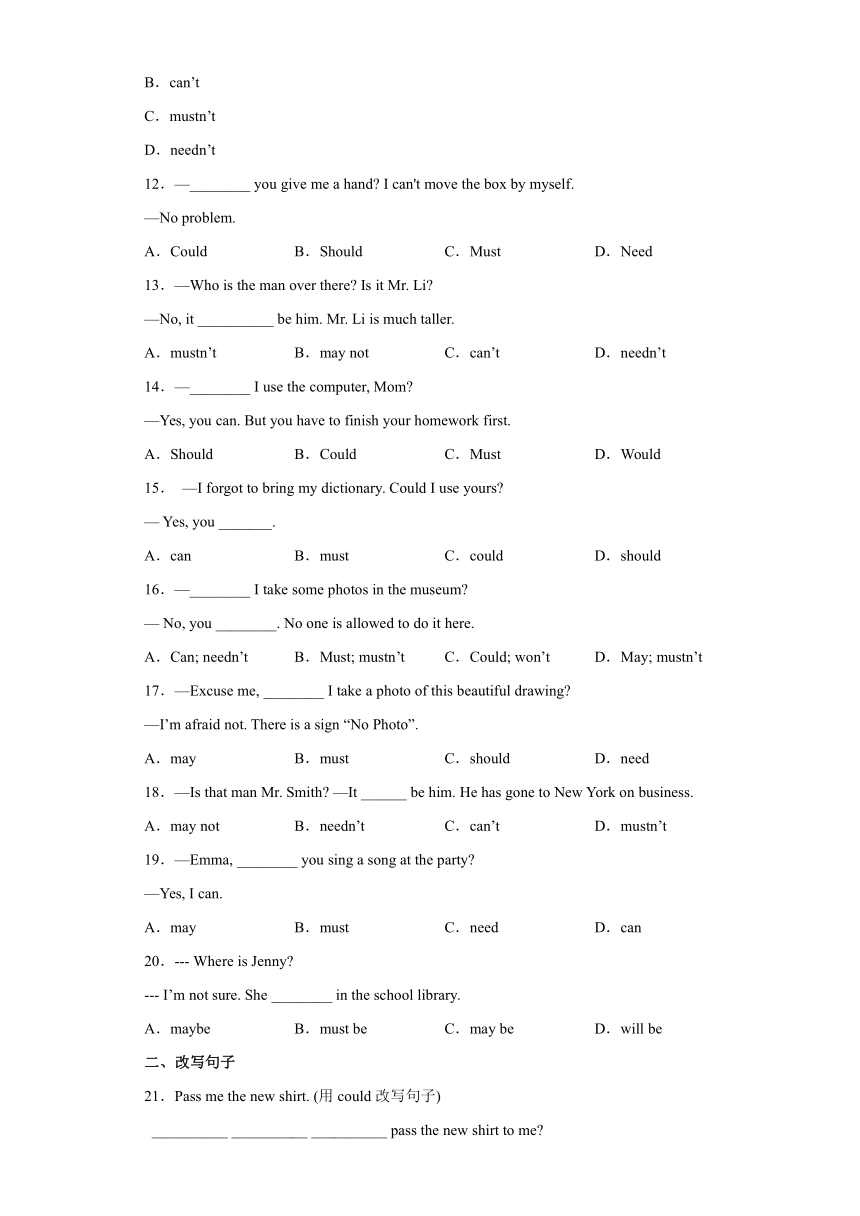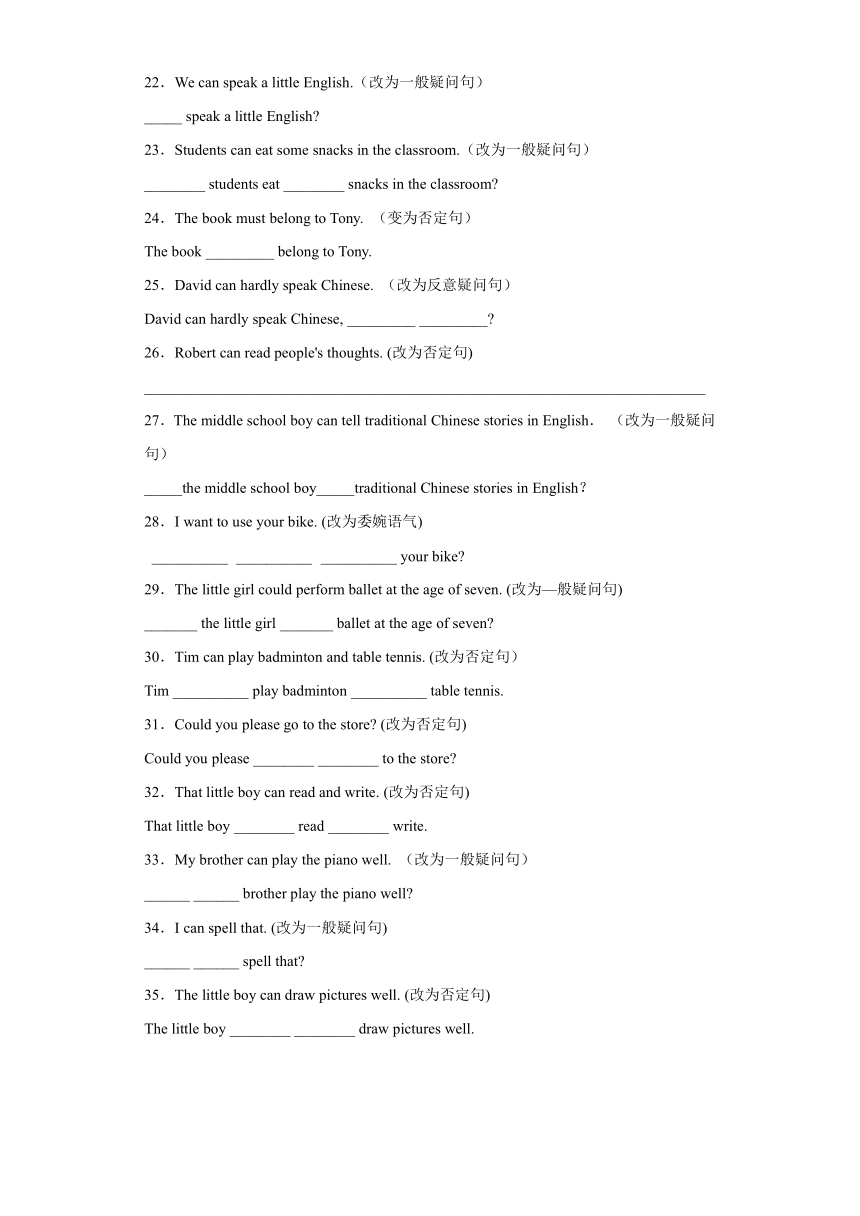人教版中考二轮复习情态动词专项练(一)(含答案)
文档属性
| 名称 | 人教版中考二轮复习情态动词专项练(一)(含答案) |

|
|
| 格式 | docx | ||
| 文件大小 | 21.3KB | ||
| 资源类型 | 教案 | ||
| 版本资源 | 人教新目标(Go for it)版 | ||
| 科目 | 英语 | ||
| 更新时间 | 2023-02-11 00:00:00 | ||
图片预览



文档简介
情态动词专项练(一)
一、单项选择
1.I think playing soccer is very easy, so you ________ play it well.
A.must B.may C.can’t D.can
2.—Mum, it’s too hot. ________ I swim in the lake
—No, you ___________. That’s too dangerous!
A.Should; can’t B.Need; mustn’t C.Must; needn’t D.Could; mustn’t
3.David, you please sweep the floor and take out the trash
A.could B.may C.might D.must
4.—Who is the lady over there Is it Miss Zhang
—It ________ be her. Miss Zhang is much taller.
A.needn’t B.mustn’t C.shouldn’t D.can’t
5.—What are you going to do tomorrow
—I’m not sure. I ________ make a trip to Hangzhou with my girl friend.
A.may B.can C.will D.must
6.—Could you play the piano when you were six
—No, I ________. I started at the age of seven.
A.can’t B.needn’t C.shouldn’t D.couldn’t
7.—Where are you going this month
—We_________ go to Xiamen, but we’re not sure.
A.needn’t B.must C.might D.mustn’t
8.— I take some photos in the hall
— No, you .
A.Can; needn't B.Must; mustn't C.Could; won't D.May; mustn't
9.— Jack, ________ you ride a bike
— Yes, I can.
A.can B.may C.need D.must
10. —________ I swim here
—I’m sorry. Children _______ swim alone here.
A.Must , can’t B.May , must C.Can, mustn’t D.Can’t can
11.Look, little Jim is swimming so fast. I ________ believe my eyes.
A.shouldn’t
B.can’t
C.mustn’t
D.needn’t
12.—________ you give me a hand I can't move the box by myself.
—No problem.
A.Could B.Should C.Must D.Need
13.—Who is the man over there Is it Mr. Li
—No, it __________ be him. Mr. Li is much taller.
A.mustn’t B.may not C.can’t D.needn’t
14.—________ I use the computer, Mom
—Yes, you can. But you have to finish your homework first.
A.Should B.Could C.Must D.Would
15. —I forgot to bring my dictionary. Could I use yours
— Yes, you _______.
A.can B.must C.could D.should
16.—________ I take some photos in the museum
— No, you ________. No one is allowed to do it here.
A.Can; needn’t B.Must; mustn’t C.Could; won’t D.May; mustn’t
17.—Excuse me, ________ I take a photo of this beautiful drawing
—I’m afraid not. There is a sign “No Photo”.
A.may B.must C.should D.need
18.—Is that man Mr. Smith —It ______ be him. He has gone to New York on business.
A.may not B.needn’t C.can’t D.mustn’t
19.—Emma, ________ you sing a song at the party
—Yes, I can.
A.may B.must C.need D.can
20.--- Where is Jenny
--- I’m not sure. She ________ in the school library.
A.maybe B.must be C.may be D.will be
二、改写句子
21.Pass me the new shirt. (用could改写句子)
__________ __________ __________ pass the new shirt to me
22.We can speak a little English.(改为一般疑问句)
_____ speak a little English
23.Students can eat some snacks in the classroom.(改为一般疑问句)
________ students eat ________ snacks in the classroom
24.The book must belong to Tony. (变为否定句)
The book _________ belong to Tony.
25.David can hardly speak Chinese. (改为反意疑问句)
David can hardly speak Chinese, _________ _________
26.Robert can read people's thoughts. (改为否定句)
__________________________________________________________________________
27.The middle school boy can tell traditional Chinese stories in English. (改为一般疑问句)
_____the middle school boy_____traditional Chinese stories in English?
28.I want to use your bike. (改为委婉语气)
__________ __________ __________ your bike
29.The little girl could perform ballet at the age of seven. (改为—般疑问句)
_______ the little girl _______ ballet at the age of seven
30.Tim can play badminton and table tennis. (改为否定句)
Tim __________ play badminton __________ table tennis.
31.Could you please go to the store (改为否定句)
Could you please ________ ________ to the store
32.That little boy can read and write. (改为否定句)
That little boy ________ read ________ write.
33.My brother can play the piano well. (改为一般疑问句)
______ ______ brother play the piano well
34.I can spell that. (改为一般疑问句)
______ ______ spell that
35.The little boy can draw pictures well. (改为否定句)
The little boy ________ ________ draw pictures well.
参考答案:
1.D
考查情态动词。must必须;may可能;can’t不可能;can可以,能够。根据“I think playing soccer is very easy”可知踢足球很容易,认为“你”能踢得好。故选D。
2.D
考查情态动词辨析。第一个空,根据Mum, it’s too hot. ____ I swim in the lake 可知句意为“妈妈,太热了。我能在湖里游泳吗?”表示征询意见,委婉的请求,用could;第二个空,根据前面的No,以及后面的That’s too dangerous!可知应是“不可以”,表示禁止用mustn’t,故选D。
3.A
A. could能,会;B. may 可以;C. might可以;D. must必须。根据横线后面的内容,扫地板,倒垃圾,所知,是表 示允许而且带有委婉的语气,could you please+动词原形,表示请你做……好吗?故选 A。
4.D
考查情态动词。needn't不必;mustn't禁止;shouldn't不应该;can't不可能。根据“Miss Zhang is much taller.”可知,张小姐更高,因此推测不可能是她,故选D。
5.A
考查情态动词。may可能;can能;will将要;must必须。由“I’m not sure.”我不确定,可知这里表示“可能去旅行”,用may表示“可能性”的推测。故选A。
6.D
考查情态动词。can’t不能;needn’t不需要;shouldn’t不应该;couldn’t不能。根据“Could you play the piano when you were six ”以及“I started at the age of seven.”可知六岁时不会弹钢琴,七岁才开始弹奏,“六岁不能弹钢琴”是过去不能的事情,应用couldn’t。故选D。
7.C
考查情态动词表推测。needn’t不必;must必须,一定;might可能; mustn’t禁止。根据回答句的“but we're not sure但是我们也不确定”,可知此处表示可能性不大的推测,故选C。
8.D
can能,could能,语气更委婉;must必须;mustn’t禁止;May可以,第一空是请求允许用May I+动词的原形+其他?表示请求允许,做否定回答用mustn’t,根据题意,故选D。
9.A
考查情态动词的用法。A.can能,会;B.may可以;C.need需要;D.must必须。“Can you… ”的肯定回答是:Yes,I /we can.否定回答是No,I/we can’t.。根据句意及答语可知,答案为A。
10.C
难度适中,must是必须,may是可能,can可能,can的意图更大一些,这里问我是否能再这里游泳,应该用can,借东西一般用may,答句是很严肃的说法,应该用must,答案选C。
11.B
shouldn't不应该,can’t不可能,mustn’t禁止,needn’t不必。根据little Jim is swimming so fast.可知小吉姆游得这么快,因此我无法相信我的眼睛,故用情态动词can’t。故选B。
12.A
本题考查情态动词。could能,should应该,must必须,need需要。根据I can't move the box by myself可知,我自己搬不动这个箱子,因此请求别人帮助,Could you do sth?你能做某事吗?表示委婉地请求。故选A。
13.C
考查情态动词。mustn’t 千万不要, may not不可以,can’t 不可能;根据Mr. Li is much taller李先生高多了,可知推测不可能是李先生,故选C。
14.B
考查情态动词辨析。Should应该;Could可以;Must必须;Would将会。根据“Yes, you can. But you have to finish your homework first”可知,空缺处应该是表请求,用Could提问表示委婉地请求,故选B。
15.A
can能,可以;must 必须;could能,会,是can的过去式;should应该。所以选A。
16.D
考查情态动词。can可以;need需要;must必须;could会;may可以;needn’t不需要;mustn’t禁止;won’t将不会。根据“I take some photos in the museum”可知,是说可以在博物馆里拍一些照片吗,can/could/may均可以;再者根据“No one is allowed to do it here.”可知,是禁止拍照,因此mustn’t符合句意,结合选项,D符合句意,故选D。
17.A
考查情态动词辨析。may可以,表示一种建议或者请求允许; must必须,不得不;should应该,表示情理上应当做;need需要,表示一种需求。根据答语“I’m afraid not”,可知本句是请求许可,需用情态动词 may。故选A。
18.C
A. may not不可以;B. needn’t不必;C. can’t不能,不可能;D. mustn’t不准,不允许,禁止。have gone to表示去了某地,未回来。因此那个人“不可能”是史密斯先生。故选C。
19.D
考查情态动词辨析。may可以(与第二人称连用表示祝福);must必须;need需要;can能。根据“Yes, I can.”可知,一般疑问句用can开头。故选D。
20.C
must的语气最强,译为“一定,准是,想必是”;may(might) , could的语气最弱,译为“也许”、“可能”。 否定语气较强时,则用can’t译为“不可能”。结合句意,故选C
21. Could you please
根据题干要求是要用could改写句子,且要改为疑问句,可知could在一般疑问句中可以表示委婉语气。原句为省略you的祈使句,变疑问句时要将you还原出来,故应为could you please,位于句首,首字母大写。故填Could;you;please。
22.Can you
原句是“情态动词+动词原形”的结构,变一般疑问句时直接将情态动词“can”提前,原句第一人称的“we”应该改为第二人称“you”。句首首字母大写。故填Can you。
23. Can any
分析句子可知句子含有情态动词can,变成一般疑问句需要把can提到主语前,位于句首,首字母大写。在疑问句中some需要变为any。故填Can;any。
24.can not must在此句中表示肯定推测,在否定句中用can not/can’t表示推测,表示“不可能”,故填can not/can’t。
25. can he
题目要求改为反意疑问句。分析句子可知,原句中含有情态动词can,所以反意部分也用can的适当形式;因为原句中含有hardly表否定,根据“前否后肯”原则,反意部分应用肯定形式;又因为原句主语是David指男性,所以用he代替。故填(1). can (2). he。
26.Robert can’t read people’s thoughts.
题目要求改为否定句。分析句子可知,原句谓语动词是can read,改为否定句只需将情态动词can改为否定形式can’t。故填Robert can’t read people’s thoughts.
27. Can tell
考查一般疑问句。含有情态动词can的句子变一般疑问句时,只需把can提至句首,谓语动词用原形tell(讲述)。故答案为:Can,tell。
28. Could I use
根据题干要求是要用委婉语气,could可以表示委婉语气,且要用疑问句式,故应为Could I use your bike ,故填Could;I;use。
29. Could perform
原句含有情态动词could,变一般疑问句将could放句首,单词首字母大写;情态动词后接动词原形,第二空用perform。故填Could;perform。
30. can’t or
原句为含情态动词can的肯定句,改为否定句时需要将情态动词变为否定式,即can’t;and用于肯定句中,否定句中要改为“or”。故填can’t;or。
31. not
go
此题要求改为否定句,由could引导的一般疑问句变否定句就是在后面加not。故填not;go。
32. can’t or
原句是含有情态动词的句子,变成否定句,直接在情态动词can后接not,肯定句中两者之间的并列用and,否定句要改成or,故填can’t;or。
33. Can your
根据题意是变成一般疑问句,含有情态动词can,变成一般疑问句,直接把can提前,主语是my brother,变成一般疑问句把my变成your。故填Can your。
34. Can you
句子中含有情态动词,变为一般疑问句,把情态动词提到主语前,同时需把第一人称I变为第二人称you。故填Can;you。
35. can not
根据题干可知,要求改为否定句,原句含有情态动词can,变否定句直接在can后面加not即可,故答案为(1)can(2) not。
一、单项选择
1.I think playing soccer is very easy, so you ________ play it well.
A.must B.may C.can’t D.can
2.—Mum, it’s too hot. ________ I swim in the lake
—No, you ___________. That’s too dangerous!
A.Should; can’t B.Need; mustn’t C.Must; needn’t D.Could; mustn’t
3.David, you please sweep the floor and take out the trash
A.could B.may C.might D.must
4.—Who is the lady over there Is it Miss Zhang
—It ________ be her. Miss Zhang is much taller.
A.needn’t B.mustn’t C.shouldn’t D.can’t
5.—What are you going to do tomorrow
—I’m not sure. I ________ make a trip to Hangzhou with my girl friend.
A.may B.can C.will D.must
6.—Could you play the piano when you were six
—No, I ________. I started at the age of seven.
A.can’t B.needn’t C.shouldn’t D.couldn’t
7.—Where are you going this month
—We_________ go to Xiamen, but we’re not sure.
A.needn’t B.must C.might D.mustn’t
8.— I take some photos in the hall
— No, you .
A.Can; needn't B.Must; mustn't C.Could; won't D.May; mustn't
9.— Jack, ________ you ride a bike
— Yes, I can.
A.can B.may C.need D.must
10. —________ I swim here
—I’m sorry. Children _______ swim alone here.
A.Must , can’t B.May , must C.Can, mustn’t D.Can’t can
11.Look, little Jim is swimming so fast. I ________ believe my eyes.
A.shouldn’t
B.can’t
C.mustn’t
D.needn’t
12.—________ you give me a hand I can't move the box by myself.
—No problem.
A.Could B.Should C.Must D.Need
13.—Who is the man over there Is it Mr. Li
—No, it __________ be him. Mr. Li is much taller.
A.mustn’t B.may not C.can’t D.needn’t
14.—________ I use the computer, Mom
—Yes, you can. But you have to finish your homework first.
A.Should B.Could C.Must D.Would
15. —I forgot to bring my dictionary. Could I use yours
— Yes, you _______.
A.can B.must C.could D.should
16.—________ I take some photos in the museum
— No, you ________. No one is allowed to do it here.
A.Can; needn’t B.Must; mustn’t C.Could; won’t D.May; mustn’t
17.—Excuse me, ________ I take a photo of this beautiful drawing
—I’m afraid not. There is a sign “No Photo”.
A.may B.must C.should D.need
18.—Is that man Mr. Smith —It ______ be him. He has gone to New York on business.
A.may not B.needn’t C.can’t D.mustn’t
19.—Emma, ________ you sing a song at the party
—Yes, I can.
A.may B.must C.need D.can
20.--- Where is Jenny
--- I’m not sure. She ________ in the school library.
A.maybe B.must be C.may be D.will be
二、改写句子
21.Pass me the new shirt. (用could改写句子)
__________ __________ __________ pass the new shirt to me
22.We can speak a little English.(改为一般疑问句)
_____ speak a little English
23.Students can eat some snacks in the classroom.(改为一般疑问句)
________ students eat ________ snacks in the classroom
24.The book must belong to Tony. (变为否定句)
The book _________ belong to Tony.
25.David can hardly speak Chinese. (改为反意疑问句)
David can hardly speak Chinese, _________ _________
26.Robert can read people's thoughts. (改为否定句)
__________________________________________________________________________
27.The middle school boy can tell traditional Chinese stories in English. (改为一般疑问句)
_____the middle school boy_____traditional Chinese stories in English?
28.I want to use your bike. (改为委婉语气)
__________ __________ __________ your bike
29.The little girl could perform ballet at the age of seven. (改为—般疑问句)
_______ the little girl _______ ballet at the age of seven
30.Tim can play badminton and table tennis. (改为否定句)
Tim __________ play badminton __________ table tennis.
31.Could you please go to the store (改为否定句)
Could you please ________ ________ to the store
32.That little boy can read and write. (改为否定句)
That little boy ________ read ________ write.
33.My brother can play the piano well. (改为一般疑问句)
______ ______ brother play the piano well
34.I can spell that. (改为一般疑问句)
______ ______ spell that
35.The little boy can draw pictures well. (改为否定句)
The little boy ________ ________ draw pictures well.
参考答案:
1.D
考查情态动词。must必须;may可能;can’t不可能;can可以,能够。根据“I think playing soccer is very easy”可知踢足球很容易,认为“你”能踢得好。故选D。
2.D
考查情态动词辨析。第一个空,根据Mum, it’s too hot. ____ I swim in the lake 可知句意为“妈妈,太热了。我能在湖里游泳吗?”表示征询意见,委婉的请求,用could;第二个空,根据前面的No,以及后面的That’s too dangerous!可知应是“不可以”,表示禁止用mustn’t,故选D。
3.A
A. could能,会;B. may 可以;C. might可以;D. must必须。根据横线后面的内容,扫地板,倒垃圾,所知,是表 示允许而且带有委婉的语气,could you please+动词原形,表示请你做……好吗?故选 A。
4.D
考查情态动词。needn't不必;mustn't禁止;shouldn't不应该;can't不可能。根据“Miss Zhang is much taller.”可知,张小姐更高,因此推测不可能是她,故选D。
5.A
考查情态动词。may可能;can能;will将要;must必须。由“I’m not sure.”我不确定,可知这里表示“可能去旅行”,用may表示“可能性”的推测。故选A。
6.D
考查情态动词。can’t不能;needn’t不需要;shouldn’t不应该;couldn’t不能。根据“Could you play the piano when you were six ”以及“I started at the age of seven.”可知六岁时不会弹钢琴,七岁才开始弹奏,“六岁不能弹钢琴”是过去不能的事情,应用couldn’t。故选D。
7.C
考查情态动词表推测。needn’t不必;must必须,一定;might可能; mustn’t禁止。根据回答句的“but we're not sure但是我们也不确定”,可知此处表示可能性不大的推测,故选C。
8.D
can能,could能,语气更委婉;must必须;mustn’t禁止;May可以,第一空是请求允许用May I+动词的原形+其他?表示请求允许,做否定回答用mustn’t,根据题意,故选D。
9.A
考查情态动词的用法。A.can能,会;B.may可以;C.need需要;D.must必须。“Can you… ”的肯定回答是:Yes,I /we can.否定回答是No,I/we can’t.。根据句意及答语可知,答案为A。
10.C
难度适中,must是必须,may是可能,can可能,can的意图更大一些,这里问我是否能再这里游泳,应该用can,借东西一般用may,答句是很严肃的说法,应该用must,答案选C。
11.B
shouldn't不应该,can’t不可能,mustn’t禁止,needn’t不必。根据little Jim is swimming so fast.可知小吉姆游得这么快,因此我无法相信我的眼睛,故用情态动词can’t。故选B。
12.A
本题考查情态动词。could能,should应该,must必须,need需要。根据I can't move the box by myself可知,我自己搬不动这个箱子,因此请求别人帮助,Could you do sth?你能做某事吗?表示委婉地请求。故选A。
13.C
考查情态动词。mustn’t 千万不要, may not不可以,can’t 不可能;根据Mr. Li is much taller李先生高多了,可知推测不可能是李先生,故选C。
14.B
考查情态动词辨析。Should应该;Could可以;Must必须;Would将会。根据“Yes, you can. But you have to finish your homework first”可知,空缺处应该是表请求,用Could提问表示委婉地请求,故选B。
15.A
can能,可以;must 必须;could能,会,是can的过去式;should应该。所以选A。
16.D
考查情态动词。can可以;need需要;must必须;could会;may可以;needn’t不需要;mustn’t禁止;won’t将不会。根据“I take some photos in the museum”可知,是说可以在博物馆里拍一些照片吗,can/could/may均可以;再者根据“No one is allowed to do it here.”可知,是禁止拍照,因此mustn’t符合句意,结合选项,D符合句意,故选D。
17.A
考查情态动词辨析。may可以,表示一种建议或者请求允许; must必须,不得不;should应该,表示情理上应当做;need需要,表示一种需求。根据答语“I’m afraid not”,可知本句是请求许可,需用情态动词 may。故选A。
18.C
A. may not不可以;B. needn’t不必;C. can’t不能,不可能;D. mustn’t不准,不允许,禁止。have gone to表示去了某地,未回来。因此那个人“不可能”是史密斯先生。故选C。
19.D
考查情态动词辨析。may可以(与第二人称连用表示祝福);must必须;need需要;can能。根据“Yes, I can.”可知,一般疑问句用can开头。故选D。
20.C
must的语气最强,译为“一定,准是,想必是”;may(might) , could的语气最弱,译为“也许”、“可能”。 否定语气较强时,则用can’t译为“不可能”。结合句意,故选C
21. Could you please
根据题干要求是要用could改写句子,且要改为疑问句,可知could在一般疑问句中可以表示委婉语气。原句为省略you的祈使句,变疑问句时要将you还原出来,故应为could you please,位于句首,首字母大写。故填Could;you;please。
22.Can you
原句是“情态动词+动词原形”的结构,变一般疑问句时直接将情态动词“can”提前,原句第一人称的“we”应该改为第二人称“you”。句首首字母大写。故填Can you。
23. Can any
分析句子可知句子含有情态动词can,变成一般疑问句需要把can提到主语前,位于句首,首字母大写。在疑问句中some需要变为any。故填Can;any。
24.can not must在此句中表示肯定推测,在否定句中用can not/can’t表示推测,表示“不可能”,故填can not/can’t。
25. can he
题目要求改为反意疑问句。分析句子可知,原句中含有情态动词can,所以反意部分也用can的适当形式;因为原句中含有hardly表否定,根据“前否后肯”原则,反意部分应用肯定形式;又因为原句主语是David指男性,所以用he代替。故填(1). can (2). he。
26.Robert can’t read people’s thoughts.
题目要求改为否定句。分析句子可知,原句谓语动词是can read,改为否定句只需将情态动词can改为否定形式can’t。故填Robert can’t read people’s thoughts.
27. Can tell
考查一般疑问句。含有情态动词can的句子变一般疑问句时,只需把can提至句首,谓语动词用原形tell(讲述)。故答案为:Can,tell。
28. Could I use
根据题干要求是要用委婉语气,could可以表示委婉语气,且要用疑问句式,故应为Could I use your bike ,故填Could;I;use。
29. Could perform
原句含有情态动词could,变一般疑问句将could放句首,单词首字母大写;情态动词后接动词原形,第二空用perform。故填Could;perform。
30. can’t or
原句为含情态动词can的肯定句,改为否定句时需要将情态动词变为否定式,即can’t;and用于肯定句中,否定句中要改为“or”。故填can’t;or。
31. not
go
此题要求改为否定句,由could引导的一般疑问句变否定句就是在后面加not。故填not;go。
32. can’t or
原句是含有情态动词的句子,变成否定句,直接在情态动词can后接not,肯定句中两者之间的并列用and,否定句要改成or,故填can’t;or。
33. Can your
根据题意是变成一般疑问句,含有情态动词can,变成一般疑问句,直接把can提前,主语是my brother,变成一般疑问句把my变成your。故填Can your。
34. Can you
句子中含有情态动词,变为一般疑问句,把情态动词提到主语前,同时需把第一人称I变为第二人称you。故填Can;you。
35. can not
根据题干可知,要求改为否定句,原句含有情态动词can,变否定句直接在can后面加not即可,故答案为(1)can(2) not。
同课章节目录
- 词法
- 名词
- 动词和动词短语
- 动词语态
- 动词时态
- 助动词和情态动词
- 非谓语动词
- 冠词
- 代词
- 数词和量词
- 形容词副词及其比较等级
- 介词和介词短语
- 连词和感叹词
- 构词法
- 相似、相近词比较
- 句法
- 陈述句
- 一般疑问句和否定疑问句
- 特殊疑问句及选择疑问句
- 反意疑问句
- 存在句(There be句型)
- 宾语从句
- 定语从句
- 状语从句
- 主谓一致问题
- 简单句
- 并列句
- 复合句
- 主谓一致
- 主、表语从句
- 名词性从句
- 直接引语和间接引语
- 虚拟语气
- 感叹句
- 强调句
- 倒装句
- 祈使句
- 句子的成分
- 句子的分类
- 题型专区
- 单项选择部分
- 易错题
- 完形填空
- 阅读理解
- 词汇练习
- 听说训练
- 句型转换
- 补全对话
- 短文改错
- 翻译
- 书面表达
- 任务型阅读
- 语法填空
- 其他资料
